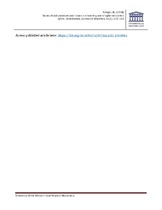| dc.contributor.author | Njenga, James Kariuki | |
| dc.date.accessioned | 2019-07-02T12:12:10Z | |
| dc.date.available | 2019-07-02T12:12:10Z | |
| dc.date.issued | 2018 | |
| dc.identifier.citation | Njenga, J.K. (2018). Sociocultural paradoxes and issues in e-learning use in higher education. Africa, Globalisation, Societies & Education, 16(1), 120–133. | en_US |
| dc.identifier.issn | 1476-7732 | |
| dc.identifier.uri | https://doi.org/10.1080/14767724.2017.1390664 | |
| dc.identifier.uri | http://hdl.handle.net/10566/4697 | |
| dc.description.abstract | Sociocultural issues are major contributing factors in mass acceptance and
effective use of technology. These issues are often perceived to contradict
the benefits the technology brings about. E-learning use in higher
education in Africa, as a technology, faces some sociocultural barriers
that contradict its promise and benefits. This paper identifies five social
cultural paradoxes, namely globalisation, cultural identity, westernisation,
authenticity and foreign ideologies, with the aim of creating awareness
of, and eliciting the interventions required to improve the acceptance
and use of e-learning. The paper presents the differing and
contradictory views of technology advocates and technology sceptics on
the use of e-learning in higher in Africa. | en_US |
| dc.language.iso | en | en_US |
| dc.publisher | Routledge | en_US |
| dc.subject | Teaching in a digital world | en_US |
| dc.subject | E-learning | en_US |
| dc.subject | Sociocultural | en_US |
| dc.subject | Africa | en_US |
| dc.subject | Globalisation | en_US |
| dc.subject | Decolonising education | |
| dc.title | Sociocultural paradoxes and issues in e-learning use in higher education Africa | en_US |
| dc.type | Article | en_US |

